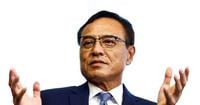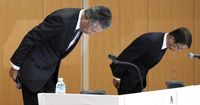Shockwaves rippled through Japan’s business world this week as Takeshi Niinami, the influential chief executive of beverage giant Suntory Holdings, abruptly resigned amid a police investigation into his alleged purchase of illegal supplements. The resignation, announced on September 2, 2025, marks a dramatic turn for a company and a leader long seen as symbols of Japan’s modern corporate dynamism and global ambition.
Niinami, 66, had helmed Suntory since 2014, leading the iconic drinks maker through a decade of robust growth and international expansion. According to Reuters, his leadership was marked by bold moves, including the $16 billion acquisition of U.S. spirits company Beam, which transformed Suntory into one of the world’s largest spirits producers. Under his stewardship, both profits and sales surged, and the company’s portfolio expanded to include global brands like Jim Beam, Laphroaig, Orangina, and Lucozade.
The crisis erupted in late August when Niinami informed Suntory’s board that he was under police investigation. As reported by Reuters and The Guardian, police in Fukuoka prefecture were probing whether supplements containing cannabis components—specifically THC, the psychoactive ingredient in cannabis and illegal in Japan—had been sent to Niinami’s Tokyo residence. The investigation was reportedly linked to the arrest of another man in July. Japanese media outlets, including Tokyo Shimbun and Nippon TV, suggested that Niinami was suspected of importing THC-containing products from the United States, where cannabis laws are far more permissive.
Japan, however, maintains some of the world’s strictest drug laws. While CBD, a non-psychoactive compound derived from cannabis, is legal in Japan, it must be entirely free of THC. Possession of cannabis can result in penalties of up to seven years in prison. According to The Guardian, police searched Niinami’s luxury Tokyo apartment last month and collected a urine sample, but no illegal substances were detected and no formal charges have been filed against him.
Niinami has consistently maintained his innocence. In a statement to the Asahi newspaper, he declared, “I was not aware that it was an illegal supplement. I am innocent.” He further explained that he had purchased the supplement believing it to be legal and told Suntory’s board, “I felt the company would be unable to unite if I did not resign.”
Suntory’s leadership, for their part, responded swiftly. Nobuhiro Torii, the company’s president and a great-grandson of founder Shinjiro Torii, told reporters that the resignation was accepted in order to uphold corporate governance standards and public trust. “He was a dynamic and decisive leader whom I respect greatly. During a decade of his leadership, both profits and sales grew dynamically,” Torii said at a hastily arranged press conference, as reported by AP. “The entire company will work together to regain trust.”
Vice President Kenji Yamada echoed that sentiment, stating, “Regardless of whether he is found innocent or guilty, we feel he is not fit for the job.” Yamada also noted that the alleged drug might have been a supplement Niinami acquired personally, and that Niinami claimed he did not know it was illegal—a detail that highlights the complexities of supplement regulation in Japan and globally.
The company’s decision to accept Niinami’s resignation before the conclusion of the police investigation underscores the weight of accountability in Japanese corporate culture. As AP pointed out, it is common in Japan for executives to step down to avoid bringing embarrassment or shame to their organizations, regardless of legal outcomes. “It was inevitable because of governance issues,” Torii said, referencing the cultural expectation for leaders to take responsibility in times of crisis.
The news conference, which took place after markets closed on September 2, was clearly intended to reassure both investors and consumers. Suntory’s shares traded in Tokyo responded positively, gaining 2.9% that day. Shares of its listed subsidiary, Suntory Beverage & Food, also closed up 3%, according to Reuters. The company emphasized that Torii would now take full responsibility for all operations, including overseas business, as it navigates the fallout from the scandal.
Niinami’s resignation has broader implications for Japanese business and governance. As chairman of the influential Keizai Doyukai (Japan Association of Corporate Executives), Niinami has long played a key role in shaping economic policy and corporate norms. He has served as an adviser to several Japanese prime ministers and was often the face of Japanese industry at international forums such as Davos. Known for his outspoken views, Niinami has publicly challenged traditional business practices and advocated for economic reforms, including calling on the Bank of Japan to raise interest rates to help households facing a cost-of-living crisis.
His departure raises questions about the future of Suntory’s global strategy. Niinami was the first chief executive from outside the founding family, and his tenure was defined by efforts to raise Suntory’s international profile and counter slowing domestic consumption. According to The Guardian, his exit may prompt a reassessment of the company’s direction at a time when international competition in the beverage industry is fiercer than ever.
Despite stepping down from Suntory, Niinami intends to continue as chairman of the Keizai Doyukai, at least for now. He is scheduled to hold a press conference for the business lobby on September 3, where he is expected to address the investigation and the circumstances behind his resignation. Officials from the Keizai Doyukai have yet to comment publicly on the situation.
This is not the first time a high-profile executive in Japan has been ensnared in a drug-related scandal. In recent years, other corporate leaders—including the former CEO of Olympus and a Toyota executive—have faced investigations or arrests over alleged violations of Japan’s stringent drug laws. These episodes have reinforced the country’s zero-tolerance approach and the significant reputational risks facing companies and individuals alike.
Suntory, founded in 1899, remains one of the world’s leading beverage companies, with over 265 group firms and more than 40,000 employees globally. As the company faces this latest test, its leadership has signaled a commitment to transparency and restoring trust. For now, all eyes are on how Suntory and its former chief will weather this storm—and what it will mean for the future of Japanese corporate governance on the world stage.


